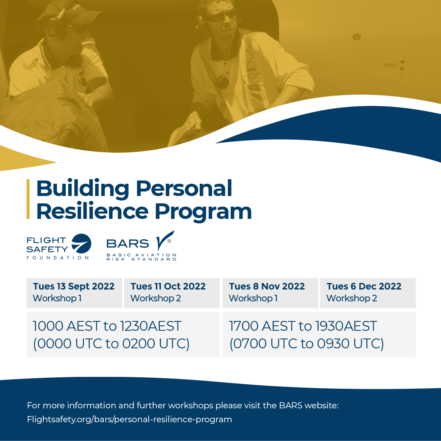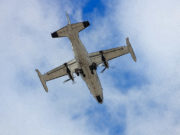
As is the case with many industries, the aviation sector has been hit hard during the COVID-19 pandemic. Many aviation professionals lost friends and loved ones, as well as their jobs, work communities, support networks and self-identities. Recognizing the pandemic’s mental health impacts, Flight Safety Foundation’s Basic Aviation Risk Standard (BARS) office introduced the Building Personal Resilience Program (BPRP) to support its member organizations and the broader aviation community and to mitigate the safety risks that could result from mental health challenges facing aviation professionals. The following interview with Nicole Gray, senior psychologist and principle human factors adviser at The Keil Centre and BPRP facilitator, has been edited for length and clarity.
Q: What was your role in developing the BARS Building Personal Resilience Program?
A: I have a background in military psychology, and I created the original program for BHP back in 2016. I take psychological concepts and principles that are well established in therapeutic interventions and high-performance coaching and then communicate them in practical ways.
In a nutshell, I lead the development of the program materials and facilitate the training. I also train facilitators to run the program within their company.
Q: Who can benefit the most from this type of program?
A: It can benefit everyone, whether an aviation worker or not. The program assists people facing challenging or stressful times in multiple environments — workplace, home and the community. It’s not group therapy. This program is about proactive self-awareness and skills development to support more effective self-regulation. The program helps people understand their stress response, enables recognition of response patterns, and helps adjust coping strategies to manage life’s challenges more effectively.
Q: What was the catalyst for creating the BARS Building Personal Resilience Program?
A: The aviation sector was hit very hard during the pandemic. Many people lost loved ones; others lost their employment. Aviation workers lost their community, support networks and self-identities. The BARS program identified the need to support its members through this critical time and wanted something impactful to make a difference and set BARS Program members up for success.
In creating this program, we wanted to know if we could teach people to be more resilient and position them to face life’s challenges and have the skills to make it to the other side. The answer is yes.
 Q: Why is mental health so important when it comes to safety?
Q: Why is mental health so important when it comes to safety?
A: Good mental health and resilience are key contributors to successfully executing roles in high-risk industries such as aviation. Many aviation professionals silently suffer through mental health challenges, too afraid to tell anyone for fear of losing their career.
People in high-stress situations are at increased risk for error, become more risk-tolerant, and make riskier decisions. If professionals maintain personal resilience with simple strategies, it can make a real difference and allow for early intervention strategy, allowing for a more collaborative and positive work culture. By applying effective strategies, we can help reduce serious consequences and create a safer aviation industry.
Q: Can resilience be taught or is it something with which individuals are born?
A: Resilience is not a personality trait, but rather a set of specific skills that, when applied to real-life challenges, supports an individual to recognize and respond to their stress response.
Q: What stops aviation professionals from reporting their feelings to their managers when they are struggling?
A: Like professionals in all industries, aviation organizational cultures have not traditionally been conducive to open discussion about mental health challenges. As leaders, how we respond to mental health discussions is critical. Actions speak louder than words, so leaders’ behaviors must show an open culture so employees can feel confident that they can share their thoughts and feelings without judgement. Consistent genuine care and respect for each other are key.
Q: How can aviation professionals foster a culture that is more open about mental health?
A: We must foster a culture where disclosing our mental health challenges is normalized and welcomed. The most powerful and impactful action that leaders can take is to start those conversations and continue them regularly. They must lead them by courageously sharing their stories of the challenges. Being vulnerable creates real connections and helps others to open up more about their struggles.
Q: With mental health a focus for many organizations, how do you expect the aviation sector to evolve?
A: Cultural change is slow. We have improved in the last 20 years, but there is a long way to go. I hope the BARS Personal Resilience Program becomes widely accepted, and many aviation organizations choose to participate. This participation will help equip their employees with the skills and strategies to support themselves and others. In my grand vision, the future is one where we genuinely and confidently bring our whole selves to work.
